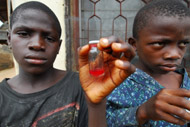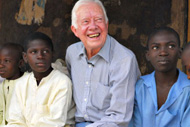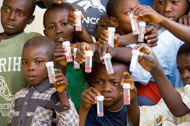Featured August 2007
The Izumi Foundation is a valuable partner in the effort to combat schistosomiasis, a devastating tropical parasitic disease. Based in Boston, Mass., the Izumi Foundation was originally founded in 1998 by a lay Buddhist order known as Shinnyo-en. The Izumi Foundation's mission is rooted in compassion for people who suffer from infectious diseases, particularly neglected infectious diseases, in developing nations. With support from the Izumi Foundation, the Center's Schistosomiasis Control Program has provided relief for the suffering of hundreds of thousands of people through the provision of the anthelminthic drug, praziquantel. In 2006 alone, The Carter Center and its partners provided 147,895 praziquantel treatments for schistosomiasis.
Schistosomiasis is a disease that impacts 200 million people in 74 countries, the majority of whom are children. People become infected by swimming or bathing in water contaminated with parasitic larvae that emerge from snails. The parasites penetrate the skin and live for years in veins near the bladder and/or intestines, where they lay thousands of spiny eggs, which tear and scar intestines, liver, bladder, and lung tissue. It is a disease caused by poverty, poor living conditions, inadequate sanitation and water supply, and unplanned water resource development.
A single, annual dose of praziquantel gives immediate relief from symptoms like severe itching, blood in the urine and stool, cramping, anemia, and bladder dysfunction. Controlling schistosomiasis strengthens communities and local economies. Other infections become less threatening as people's immune systems regain strength. Children return to school, farmers to their fields, and the cycle of poverty and disease is interrupted.
An article by Colleen Mastony that appeared in The Chicago Tribune on March 14, 2007, titled "River Parasite Eats at Children; Neglected Scourge in Africa is Cheap and Easy to Treat, but the Pennies Cannot Be Found," pointed out that a single dose of praziquantel costs only twenty cents. Yet, because schistosomiasis is not fatal, it is a low priority for many international agencies and governments. Thanks to the compassionate perspective of donors such as the Izumi Foundation, children and adults with debilitating, excruciating schistosomiasis have access to the life-changing treatments they need and a reason to hope.
Please sign up below for important news about the work of The Carter Center and special event invitations.


Carter Center Photo: Emily Staub
(Click to enlarge)
A boy in Nasarawa, Nigeria, discovers blood in his urine—a sign of schistosomiasis. The pain is so great that children stay away from school, experience stunted growth, and sometimes face premature death.

Carter Center Photo: Emily Staub
(Click to enlarge)
President Carter visited endemic villages in Nigeria in February 2007, where he saw firsthand the hope that simple treatment can bring.

Carter Center Photo: Louise Gubb
(Click to enlarge)
One in five Nigerian children in untreated areas find blood in their urine due to schistosomiasis. The Carter Center and its partners are working to change this.